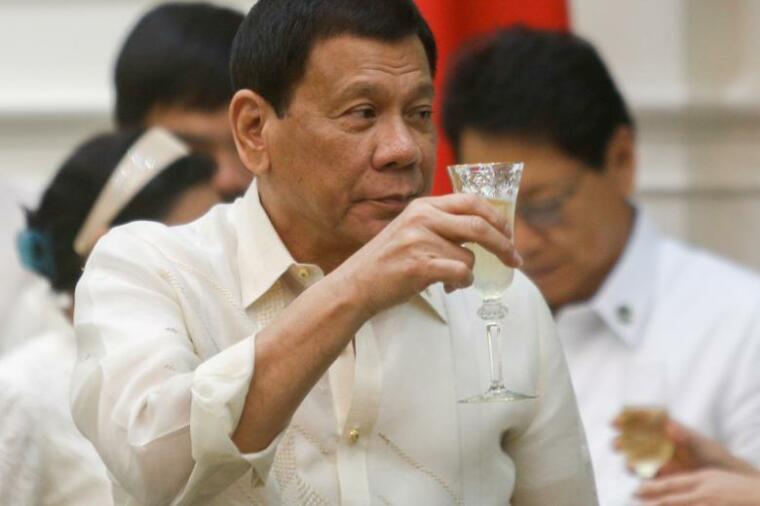Catholic church denounces Philippine president's plan to execute five to six convicts daily

Catholic church leaders in the Philippines has described President Rodrigo Duterte's plan to execute five to six criminals daily as "barbaric."
Duterte has made it a legislative priority to restore the death penalty since he took office in June. It was abolished in 2006 due to fierce opposition from the Catholic Church.
"There was death penalty before but nothing happened. Return that to me and I would do it every day: five or six (criminals). That's for real," the Philippine president said on Saturday, according to AFP.
An official from the Catholic Bishops' Conference of the Philippines (CBCP) said that the Church is "totally opposed" to the president's plan.
"The Philippines will be viewed as very barbaric," Father Jerome Secillano, executive secretary of CBCP's public affairs office, told AFP.
"It's going to make the Philippines the capital of death penalty in the world," he added.
Before Duterte assumed office, he vowed to introduce executions by hanging and said that he did not want to waste bullets. He claimed that snapping the spinal cord was more humane than a firing squad.
The president suggested that the death penalty is a matter of retribution and not as a means to deter crime.
Zeid Ra'ad Al Hussein, the human rights chief of the U.N., wrote a letter to the Philippine congress this month to warn them that reviving the death penalty would violate the country's international obligations.
Duterte insisted on Saturday that the death penalty is necessary in order to fight the drug scourge which he said was "destroying" the country.
Some of the president's aides have dismissed his statements as hyperbole, but some human rights advocates are concerned about his remarks.
"Setting a quota for executions is just too much. One death is too much because we are talking about lives," Amnesty International Philippines vice chairman Romeo Cabarde told AFP.
Secillano said that bishops are planning to attend the congressional debates next month and discourage lawmakers from voting in favor of the death penalty.
More than 2,000 people have died at the hands of the police since the drug war was launched in July. Almost 4,000 more people were killed by unidentified gunmen, according to Phelim Kine, the deputy director of Human Rights Watch's Asia division.
A survey conducted by the Social Weather Stations revealed that 78 percent of Filipinos are afraid that they or someone in their family would become victims of extrajudicial killings.
The study indicated that a majority supports the war on drugs, but as many as 71 percent said that it was "very important" for the police to keep the drug suspects alive.
 Christians don't have to affirm transgenderism, but they can’t express that view at work: tribunal
Christians don't have to affirm transgenderism, but they can’t express that view at work: tribunal Archaeology discovery: Medieval Christian prayer beads found on Holy Island
Archaeology discovery: Medieval Christian prayer beads found on Holy Island Presbyterian Church in America votes to leave National Association of Evangelicals
Presbyterian Church in America votes to leave National Association of Evangelicals Over 50 killed in 'vile and satanic' attack at Nigerian church on Pentecost Sunday
Over 50 killed in 'vile and satanic' attack at Nigerian church on Pentecost Sunday Ukrainian Orthodox Church severs ties with Moscow over Patriarch Kirill's support for Putin's war
Ukrainian Orthodox Church severs ties with Moscow over Patriarch Kirill's support for Putin's war Islamic State kills 20 Nigerian Christians as revenge for US airstrike
Islamic State kills 20 Nigerian Christians as revenge for US airstrike Man who served 33 years in prison for murder leads inmates to Christ
Man who served 33 years in prison for murder leads inmates to Christ


 Nigerian student beaten to death, body burned over ‘blasphemous’ WhatsApp message
Nigerian student beaten to death, body burned over ‘blasphemous’ WhatsApp message 'A new low': World reacts after Hong Kong arrests 90-year-old Cardinal Joseph Zen
'A new low': World reacts after Hong Kong arrests 90-year-old Cardinal Joseph Zen Iran sentences Christian man to 10 years in prison for hosting house church worship gathering
Iran sentences Christian man to 10 years in prison for hosting house church worship gathering French Guyana: Pastor shot dead, church set on fire after meeting delegation of Evangelicals
French Guyana: Pastor shot dead, church set on fire after meeting delegation of Evangelicals ‘Talking Jesus’ report finds only 6% of UK adults identify as practicing Christians
‘Talking Jesus’ report finds only 6% of UK adults identify as practicing Christians Mission Eurasia ministry center blown up in Ukraine, hundreds of Bibles destroyed: 'God will provide'
Mission Eurasia ministry center blown up in Ukraine, hundreds of Bibles destroyed: 'God will provide' Church holds service for first time after ISIS desecrated it 8 years ago
Church holds service for first time after ISIS desecrated it 8 years ago Burger King apologizes for 'offensive campaign' using Jesus' words at the Last Supper
Burger King apologizes for 'offensive campaign' using Jesus' words at the Last Supper Uganda: Muslims abduct teacher, burn him inside mosque for praying in Christ’s name
Uganda: Muslims abduct teacher, burn him inside mosque for praying in Christ’s name